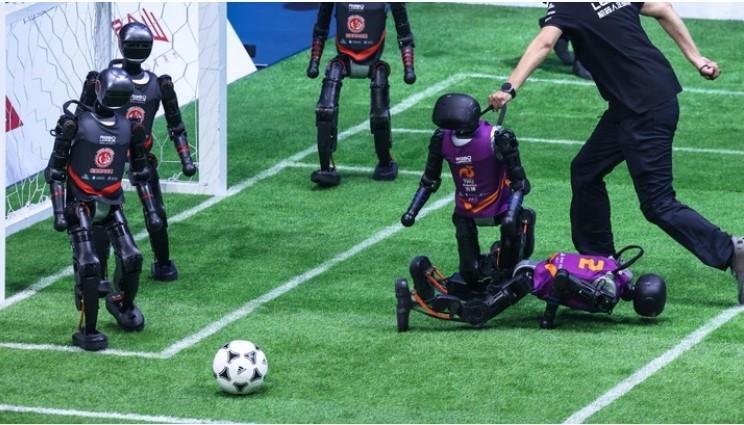
China Hosts First Fully AI-Powered Robot Football Match
In a groundbreaking event, Beijing recently hosted the first fully AI-powered robot football match, where humanoid teams competed against each other in a thrilling tournament. The event was organized to test the limits of bipedal machines and push the boundaries of human-robot interaction. The tournament saw Tsinghua University emerge as the winner, defeating its opponents 5-3.
The robot football match, which took place on January 20, 2025, was a testament to the rapid advancements being made in AI-powered robotics. The event was organized by the Chinese robotics community, in collaboration with leading universities and research institutions. The goal of the tournament was to simulate a real football match, with humanoid robots designed to mimic human movements and actions.
The robots, developed by teams from various universities and research institutions, were equipped with advanced AI algorithms that enabled them to make decisions, adapt to situations, and interact with each other in a way that was eerily similar to human football players. The robots were designed to move, jump, and even fall, just like human players, making the match a true test of their capabilities.
The match began with a high-energy pace, with robots moving swiftly around the field, kicking the ball, and attempting to score goals. However, as the game progressed, it became clear that the robots were still struggling with some technical limitations. The robots stumbled and fell, and in some cases, even got stuck in awkward positions. Despite these limitations, the robots showed remarkable resilience and adaptability, and the match remained engaging and thrilling throughout.
Tsinghua University’s robot team, designed by a team of students and researchers, ultimately emerged as the winner, defeating its opponents 5-3. The team’s robot, named “Tiger,” was praised for its agility, speed, and accuracy, and its ability to adapt to different situations and opponents.
The success of the robot football match is a significant milestone in the development of AI-powered robotics, and has implications for various fields, including healthcare, transportation, and manufacturing. The event has also sparked renewed interest in the potential applications of robotics and AI in sports, and has raised questions about the future of human-robot interaction.
Developers view sports as vital tests for human-robot interaction, citing impressive year-on-year advancements despite current technical limits. The robot football match has demonstrated the potential for robots to participate in complex and dynamic environments, and has highlighted the importance of developing robots that can adapt to changing situations and interact with humans in a natural and intuitive way.
The event has also raised questions about the future of sports, and the role that robots may play in them. With the development of advanced AI-powered robots, it is possible that robots may one day participate in human sports, either as players or as referees. The implications of this are significant, and could have far-reaching consequences for the world of sports.
In conclusion, the first fully AI-powered robot football match in Beijing was a groundbreaking event that showcased the rapid advancements being made in AI-powered robotics. The match demonstrated the potential for robots to participate in complex and dynamic environments, and highlighted the importance of developing robots that can adapt to changing situations and interact with humans in a natural and intuitive way. As the technology continues to evolve, it will be exciting to see how robots are used in the future, and the impact they may have on various fields, including sports.
Source: https://www.breezyscroll.com/world/robot-football-match-beijing-2025/






